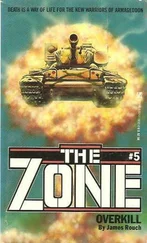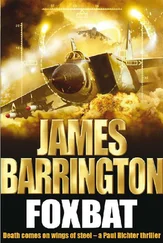‘This was taken early in the run, a few miles to the south-west of Vorkuta. The diagonal line here is the course of a river, and if you look here and here you can clearly see two feeder streams. The river was fairly dry when this film was taken. This is shown by the irregular outline of the banks and the colour changes – the dark in the centre is fairly shallow water while the slightly lighter outline is drying mud. The much lighter area is the riverbank.’
She moved the illuminated pointer down a little. ‘This square structure is the remains of a large hut, possibly originally used as a barn or byre. There isn’t sufficient left standing to clearly indicate its original purpose, but its size – about fifty feet by thirty – would suggest that it was probably a small barn. The very large dark oblong patch adjacent to the remains is a once-cultivated but now overgrown field. The darker colour is caused by the increased weed and grass growth after the fertilization of the soil that would have taken place during cultivation. There is little else of note on the frame – just fairly typical early summer tundra.’
Richter couldn’t think of anything remotely sensible to say, so he didn’t. Penny Walters smiled at him. ‘That may seem like magic, sir, but I’m very familiar with this film, and I’ve had the benefit of studying it frame by frame under high magnification.’
Richter turned to Kemp. ‘Perhaps you could talk me through the rest of it. It obviously won’t make a great deal of sense to me, but I’d like to see it anyway.’
‘Certainly. In fact, as Penny is already at the screen, she can supply the running commentary. OK, Penny? Projectionist – run it.’
Ten minutes later lights came on again in the room and Penny returned to her seat. Kemp asked if it had been any help.
‘Well, not really,’ Richter replied honestly. He thought for a few seconds. ‘I suppose you’ve done comparison studies with previous satellite films of the area?’
‘Oh, yes,’ said Kemp. ‘There haven’t been many for the last two months or so, because that area has had a fair degree of cloud cover, but there appear to have been no significant changes since the last set of high-level pictures.’
‘OK,’ Richter said, ‘forget about significant changes. Were there any changes at all?’
‘Of course. There are always minor changes, like vehicles parked in different places, houses that sprout sheds or porches, or lose them, but nothing out of the ordinary, as far as I’m aware. Have any of you seen anything that seems unusual?’
The two RAF officers shook their heads, looking slightly bored. Penny Walters didn’t shake her head, which Kemp and Richter both noticed.
‘Penny?’
She grinned, somewhat shyly. ‘Well, there was something, but I’m sure it’s of no real significance.’
She paused, and Kemp prompted her. ‘Trust the blasted Navy to see something that the RAF missed. Come on, Penny, what was it?’
‘Well, it’s not anything that’s on this film,’ she gestured towards the screen at the end of the room. ‘It’s just I noticed on a couple of the most recent satellite films that there had been a number of vehicles in a location close to the centre of the area the Blackbird filmed.’
‘And?’
‘And nothing, really. Just a bunch of vehicles.’ There was a long and slightly prickly silence. Penny Walters apparently felt the need to defend herself. ‘Commander Richter did say he wanted details of any unusual activity.’
‘That’s true,’ Richter said. ‘What sort of vehicles – military or civilian?’
‘Both,’ she replied. ‘There was one civilian lorry which appeared in the same place on two successive films, and quite a lot of other trucks, mainly military. Oh, and what looked like construction equipment.’
‘What do you mean “looked like”?’ Kemp asked sharply. ‘Either it was construction equipment or it wasn’t.’
Penny coloured slightly. ‘It was construction equipment – a digger and a bulldozer – and it arrived on two low loaders. What I meant was that it wasn’t used as far as I could see. It stayed loaded on the transporters in all the frames I saw.’
‘Peculiar,’ Richter said. ‘Were there any signs of vehicles – these or any others – in the same area in the Blackbird film?’
‘No, sir. None at all.’
Kemp nodded. ‘I agree. It is peculiar, but it doesn’t sound significant. It could, to offer a realistic and simple explanation, mean that the Russians were thinking about starting a housing project there and changed their minds because of problems with the terrain.’
Penny shook her head decisively. ‘No, sir, I don’t think so,’ she said. ‘The location was way out in the tundra, nowhere near any proper roads. If they had been going to do any major construction they would have had to spend millions of roubles on roads.’
Kemp nodded. ‘OK, let’s look at other possibilities. You didn’t see the construction equipment used, so its presence there might be irrelevant. Or, perhaps, the civilian lorries had broken down or got stuck in mud and they used the bulldozer to pull them out.’
‘But,’ Richter interrupted, ‘if the site was so remote, what were civilian lorries doing out there? And Penny said there were several vehicles – some of them military. If it had just been a breakdown, they would only have needed a recovery vehicle, or two at the most.’
‘That’s true,’ Kemp replied. ‘I’m just exploring possibilities. It might be worth looking into, but I don’t think it’s worth running the Blackbird film again. Penny has already said there are no vehicles located in that area, so we wouldn’t see anything. I think the way forward is for us to run detailed comparisons of all available films of that general area and try to deduce what the vehicles were doing there. In fact, as Penny spotted this, she can do it, because I’ve got plenty of other work building up.’ Kemp rubbed his hands together briskly. ‘Well, I think that’s it. Unless you have any other questions, Commander?’ Kemp seemed eager to get back to his ‘In’ tray, or perhaps he just wanted Richter off the premises.
‘No, I don’t think so, but please keep me informed about the comparisons.’
‘Of course.’
Richter gave Kemp the section contact telephone number, and they filed silently out of the room.
Richter surrendered his visitor’s pass, retrieved the identity card and got back into the Granada. At the Guardroom, he handed in his car pass and drove out of the main gate, turning the big saloon left – to the north and away from London to avoid the roadworks on the A1. He glanced at the dashboard clock and was surprised to find that it was already after one. He hadn’t realized that he’d been in the building for so long, and began thinking about lunch.
The two things that saved him were the left turn out of RAF Brampton’s main gate, and the bumpy road surface.
When he heard the bang and the jagged lines speared across the windscreen, Richter reacted instinctively and braked hard. When he glanced in the wing mirror, and then the interior mirror, he changed his mind. Richter floored the accelerator pedal, the auto box dropped two gears and the Granada took off like a scalded cat.
What was bothering him was not the fact that the only other car on the road was only about twenty yards behind the Granada – it was the fact that he couldn’t see it in the interior mirror because the rear screen had shattered, and slightly off-centre to the left-hand side of the car Richter could see the hole where the bullet had come in.
That definitely bothered him.
Tuesday
Anton Kirov
Читать дальше












